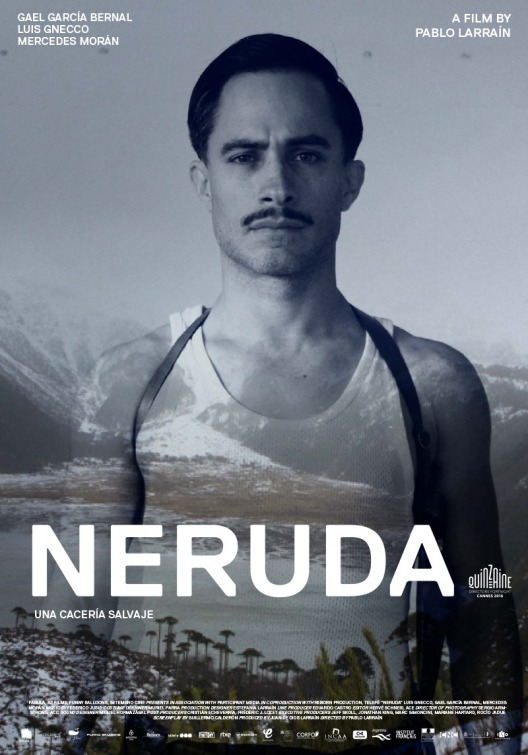Film Review |Neruda Offers a Unique View on How to Make a Biopic
Not long after the release of quasi-biopic Jackie comes Neruda, another film by the director Pablo Larrain centring upon a similarly renowned true-life personality. Set in 1948 Chile, the drama focuses upon the persecution and subsequent manhunt of Communist senator and poet Pablo Neruda (Luis Gnecco, most known to Western audiences for playing La Cucaracha in Narcos’ pilot episode) due to his criticism of the country’s president. The man tasked with finding the subversive is fascist Chief of Police Oscar Peluchonneau (Mozart in the Jungle’s Gael Garcia Bernal, playing a fictional character created for the film), a man described at one point as “half moron, half idiot”. As the cop makes his pursuit – being taunted by Neruda as he attempts to flee the country over the Andes – their battle begins to bare similarity to the tales the poet is famed and loved for.

Even on a non-narrative level, Larrain’s movies are very pleasing to the senses. Both with Jackie and Neruda, it’s clear the director has an eye for period detail and décor. The evocation of 1940’s Chile feels amazingly authentic, whether it’s the scenes set in lavish government offices to the ragged icy farms located on the hills of the Andes. His films are also unquestionably cinematic. For instance, there are moments in Guillermo Calderon’s script where characters deliver long monologues to each other, something which runs a risk of coming off as stagey. Yet, Larrain during these speeches keeps cutting to different places, continuing the to-and-fro of the dialogue but changing the background location – keeping the scene engaging. Plus, the score by Federico Jusid is excellent, beginning with classical strings but mutating into an almost Johnny Greenwood-esque cacophony of sound as the drama intensifies.
Neruda, as well as being an unconventional biopic, also shares similar themes to Jackie, as both are about how people have the capability to shape their own legacy. The central characters in the two films take drastic measures to ensure the way they will be perceived as time moves on. Luis Gnecco’s Neruda, whose bracingly and surprisingly quite unlikeable, is obsessed with mythologizing himself. He leaves notes for the detective on his trail: “Rise and be born with me, policeman brother”, while making sure he is never too far from Oscar – a means of making the chase more thrilling upon retelling. As his wife, Delia (Mercedes Moran – adding layers to her thin character), states: “he treats [the manhunt] like a novel he writes in his head”. Neruda longs to seen as the cool poet outlaw, “using his persecution to become a saint”.
[arve url=”https://www.youtube.com/watch?v=UwdpkvuWGuQ”]
However, Neruda is a lot more playful than the Natalie Portman vehicle. Larrain and Calderon, through a Being John Malkovich style twist mid-way, actually incorporate the theme of shaping one’s legacy into the structure of the movie. This then adds a layer of meta-humour on top of the drama, enabling it in its last act – a visually dazzling chase over the Andes – to gain some well-appreciated lunacy. As Oscar pursues Pablo on motorbike screaming “Pablooooooo!!”, it’s a scene that wouldn’t feel out of place in a farce like The Grand Budapest Hotel.
Yet, even with the fantastic direction and intelligently structured script, I have a niggling problem with Neruda. It’s hard to empathise or even relate to anyone in the movie. For instance, the titular poet may be a genius but he is well-aware of this fact. When Delia states she will kill herself if he leaves her, he replies: “Kill yourself if you want to. That way, I’ll write about you another 20 years”, a cruel retort even for the most troubled intellectual. Meanwhile, Bernal – despite typically brilliant work – is playing a larger than life caricature that never feels real, something certainly intentional but doesn’t necessarily evoke any emotion in the viewer. Thus, the film feels almost as cold as the snow-bound Andes, something more for the brain to engage with than the heart. That said, fans of the poet or admirers of the mind-benders of Charlie Kaufman will definitely find much to laud in Neruda. As a strictly cerebral exercise, it’s very successful.
Neruda is in cinemas from the 7th April.
Featured Image Source

